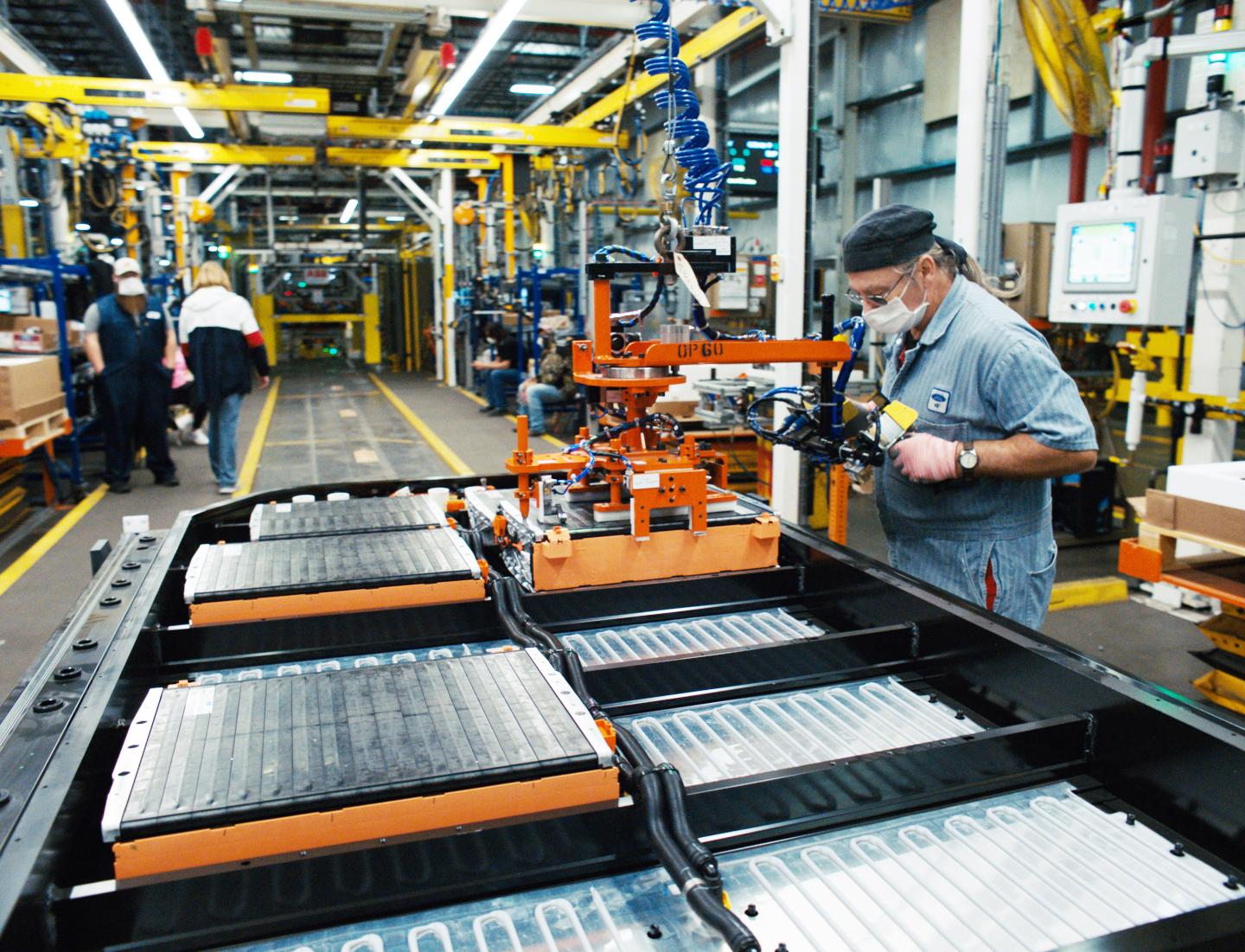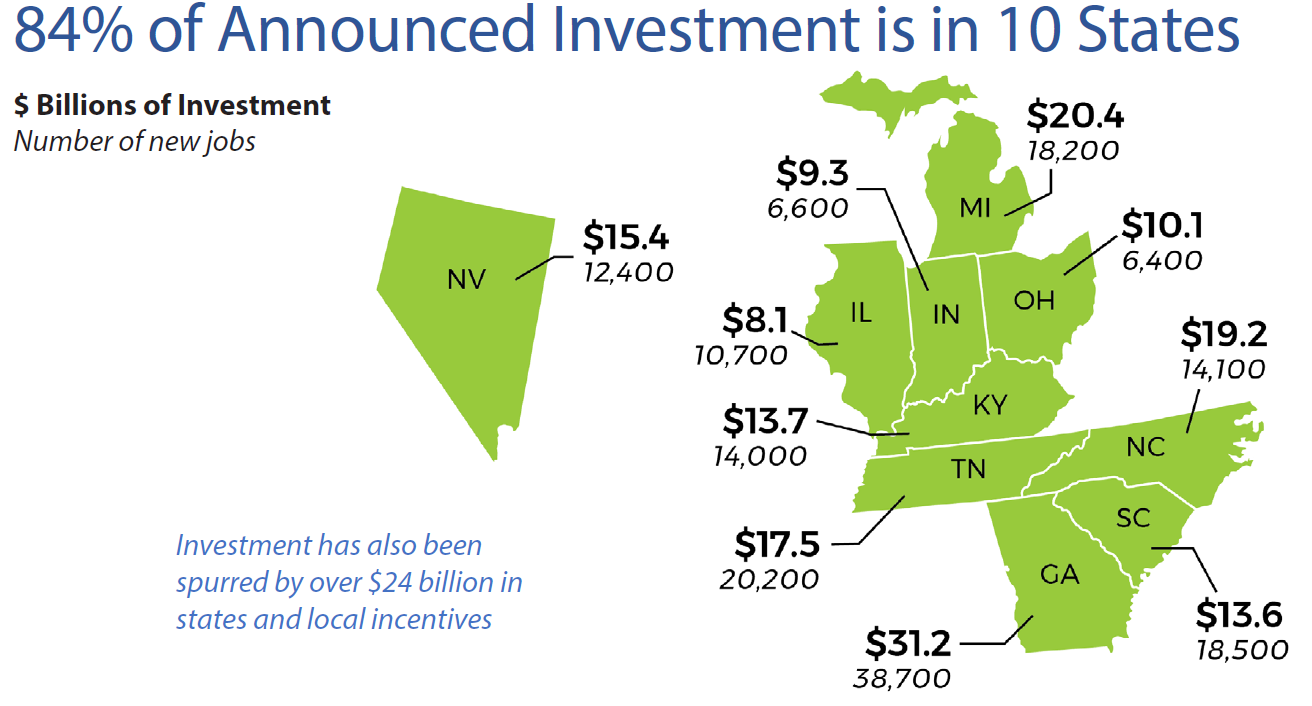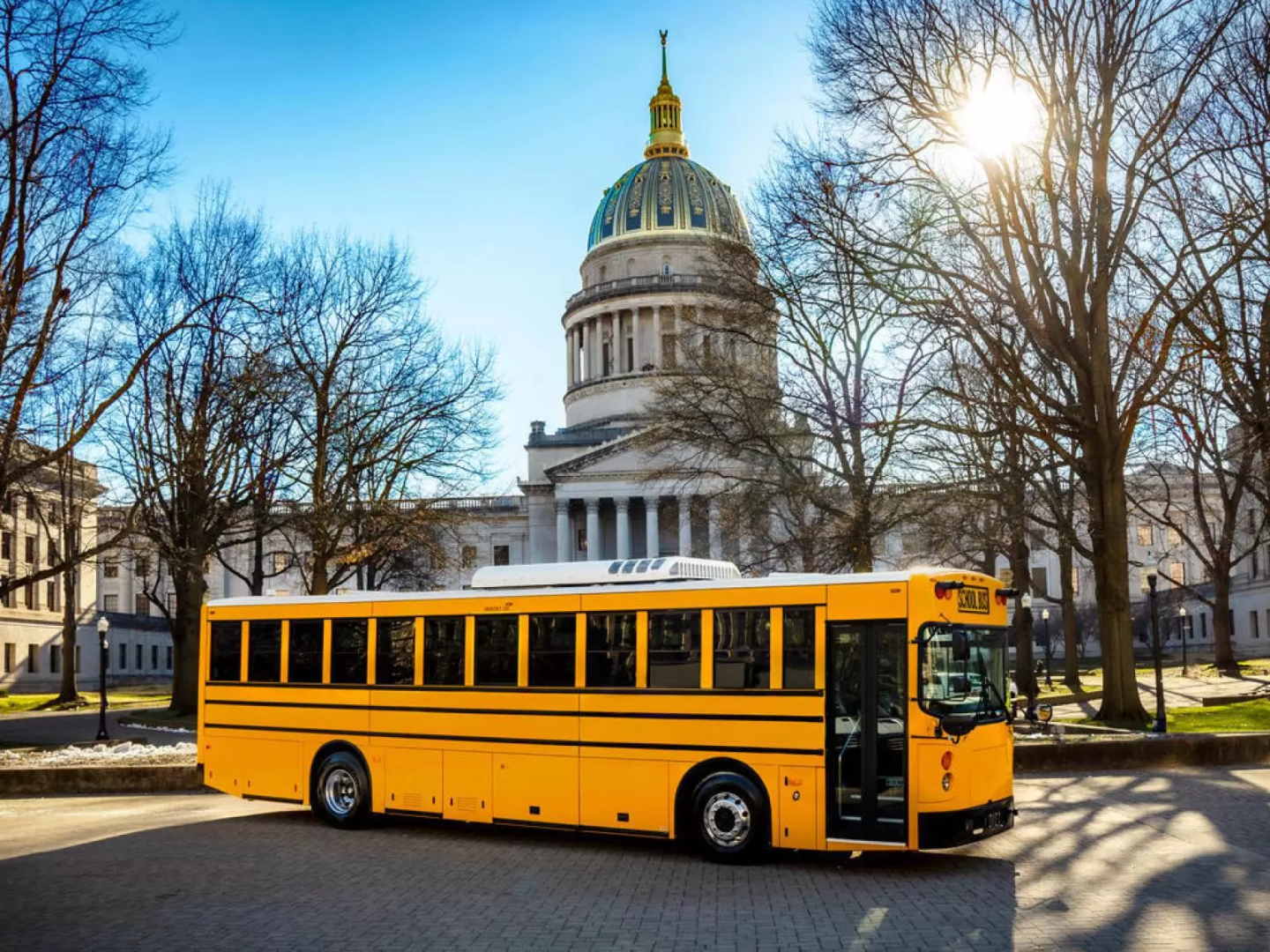Climate laws drive boom in electric vehicle jobs
(This article was updated with the latest jobs figures.)
The United States is seeing a boom in green jobs announcements, following the passage of the Inflation Reduction Act in 2022 and Bipartisan Infrastructure Law the year before.
Over the next five years, 28 states will boast new factories or production lines to manufacture electric vehicles, batteries, components and chargers, supporting more than 144,000 jobs.

Since the passage of the Infrastructure Law in 2021, auto manufacturers’ new investment announcements across the U.S. have totaled $154 billion.
These announcements build on what was already a growing industry. Over the last nine years, manufacturers have announced more than 194,000 new and retained EV jobs and $188 billion in electric vehicle investment, according to a new report from Environmental Defense Fund and WSP.
Recent announcements include an almost $8 billion investment to expand a Toyota battery manufacturing facility in Liberty, North Carolina and the construction of a new EV components factory in Tuscarawas County, Ohio. These two facilities alone will generate as many as 3,650 new jobs, the manufacturers say.
Brett Smith, a research fellow at the nonprofit Center for Automotive Research, which studies trends in the auto industry, called the investments "remarkable."
"In the midst of the pandemic, the recession, the supply chain issues, in 2021 and 2022, the investment has been huge," he says. “We’re seeing very large numbers in the jobs announcements.”

Policies and legislation promoted by President Biden, including the 2021 Infrastructure Law and the 2022 Inflation Reduction Act, both of which include made-in-America provisions and billions of dollars in funding, have been major drivers of this growth.
The Inflation Reduction Act allocated $5 billion in grants and loans for U.S. electric vehicle manufacturing. It also supports the retooling of existing car and truck factories to enable electric vehicle-related manufacturing, saving jobs at factories or production lines previously at risk of closure.
And it includes tax credits for the purchase of personal and commercial electric cars and trucks assembled in North America.
The November 2021 Infrastructure Law provided $7.5 billion for 500,000 public electric vehicle chargers nationwide, plus $5 billion for clean school buses.
“There was already significant growth in the U.S. electric vehicle manufacturing sector before these game-changing pieces of legislation were enacted but their passage has really accelerated the pace,” says Environmental Defense Fund attorney Andy Su.
Ford’s Vice President for EV Industrialization Lisa Drake says: “I think the IRA was incredibly important for us, and frankly, it did what it intended to do .… A big win for the U.S.”

The new report from EDF and WSP found that more than 80% of the $188 billion in announced investments in EV-related factories over the last nine years and more than 144,000 new jobs announced have come since the passage of the Infrastructure Law in November 2021.
While job announcements sometimes exceed the number of jobs eventually created, some companies have already surpassed existing hiring projections. The SK Battery America’s plants in Georgia exceeded their initial hiring goals of 2,600 employees, two years ahead of schedule, and then added an additional 400 workers.
In Michigan, Ford, General Motors and LG Energy Solution are planning new and expanded vehicle and battery factories. Ford and Honda have announced new plants in Ohio. The French manufacturer Forsee Power will also set up shop in Ohio, claiming it is, “building a ‘Buy America’ compliant presence in a very strategic market.”
Georgia is among the states seeing the biggest numbers of announcements. There, the Hyundai Motor Group is building a facility that the company anticipates will create 8,500 new jobs. And Scout Motors has broken ground on a $2 billion electric truck and SUV factory outside Columbia, South Carolina that will employ 4,000 people.
Electric vehicle manufacturing is also helping to retain existing jobs.
Nissan is making a $500 million investment in electrification at its Canton, Mississippi vehicle assembly plant that will support the retraining and upskilling of nearly 2,000 jobs.
Similarly, GM's decision to build electric vehicle battery components at its existing factory in Rochester, New York will help sustain the almost 750 jobs there.
“This factory invented fuel injection and now Rochester workers will help power the future of electric cars in America,” said New York Senator Charles Schumer, who urged GM to keep the factory open.
Environmental Defense Fund attorney Peter Zalzal said: "Each new investment and job announcement represents an opportunity to set a strong standard for what high-quality, community-sustaining jobs in the clean economy can look like."
Money savers, lifesavers
What's good news for the economy, is good news for families’ pocketbooks, public health and the climate, too.
A report from Environmental Defense Fund and the consulting firm WSP shows that EVs can be far less expensive to own and operate than gasoline-powered cars.
Using head-to-head comparisons of popular cars and trucks — an electric Ford F-150 Lightning compared to a gas-powered F-150, for example — the report, from July 2023, shows that the total cost of EV ownership can be as much as 29% lower than gas-powered vehicles over a 10-year period.
According to the analysis, a family that chooses a Chevrolet Equinox EV can save more than $18,000 over one that buys a gas-powered Equinox.
When state and local incentives and rebates are factored in, savings are likely higher in many locations across the U.S.
According to 2021 Environmental Defense Fund analysis, moving to an all-electric fleet by 2035 would prevent as many as 5,000 premature deaths each year by 2040 and as many as 98,000 premature deaths by 2050.
In addition, ensuring that all new passenger vehicles sold in the U.S. by 2035 are zero-emitting vehicles would cut U.S. climate pollution by almost 350 million tons each year by 2035 — the equivalent of taking more than 68 million cars off the roads.
“The climate benefits of EVs are vitally important,” said EDF's Executive Director Amanda Leland. “But also think about your kids breathing clean air, not diesel fumes, on electric school buses. Or all those delivery vans in your neighborhood not bringing along tailpipe pollution."


